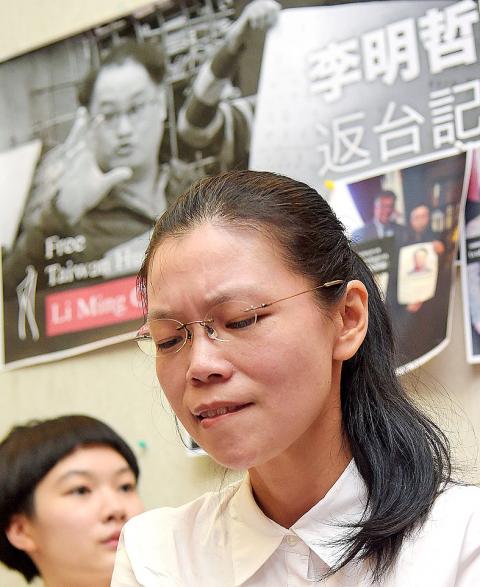Lee Ching-yu’s (李凈瑜) trip to the US last week to seek help in freeing her husband, human rights advocate Lee Ming-che (李明哲), was arranged by US non-governmental organization (NGO) China Aid, a statement released yesterday by a task force involved with the rescue efforts said.
Lee Ming-che was detained after entering Zhuhai, China, from Macau on March 19. He used to work for the Democratic Progressive Party and is a staff member at Wenshan Community College in Taipei, as well as a volunteer at the NGO Covenant Watch.
Lee Ching-yu on Thursday last week testified at a US House of Representatives committee hearing about her husband’s detention.

Photo: Huang Yao-cheng, Taipei Times
Chinese-language Next Magazine this week reported that President Tsai Ing-wen (蔡英文) sent aides to help arrange Lee Ching-yu’s US visit.
The report also said Tsai’s aides criticized Lee Ching-yu for “drawing too much attention” during her trip, affecting China’s willingness to release Lee Ming-che ahead of the Dragon Boat Festival on Tuesday.
China Aid president Bob Fu (傅希狄) on Wednesday rebuffed the magazine’s report.
In a separate statement issued yesterday, the task force involved with the rescue efforts said Lee Ching-yu’s US trip had nothing to do the Presidential Office or the government.
The government treated the issue with apathy, and the Mainland Affairs Council had ignored Lee Ching-yu’s letters, it said.
It also said that during the council’s first meeting with civic groups involved with the case on April 20, council Deputy Minister Chiu Chui-cheng (邱垂正) asked Lee Ming-che’s family members to “lay low” if they wanted China to release him.
Taiwan Foundation for Democracy president Hsu Szu-chien (徐斯儉) was assigned by the Presidential Office to work out solutions with the task force, but in effect was making their pursuit of international aid more difficult, the statement said, adding that as a result, Lee Ming-che’s family declined governmental subsidies and took matters into their own hands to defend their freedom of action and expression.
After Lee Ching-yu returned to Taiwan, no governmental agency sent officials to learn about the details, the statement said.
The information the task force heard from the Presidential Office as reported by Next Magazine were “distorted remarks that were a far cry from the truth,” it added.
“Compared with the support and goodwill the White House had shown us, the Tsai administration was cold-hearted and indifferent toward the victim,” it said.
The trip was single-handedly organized by Fu with the help of China Aid, as Lee Ching-yu could not have arranged it by herself, it said.
The statement also called on Beijing to immediately release Lee Ming-che, “whose humanitarian work is noble and respected,” in addition to urging the Tsai administration to stop fabricating lies.
“We understand that, given the circumstances across the Taiwan Strait, there is little the government can do to rescue Lee Ming-che. We can also live with the government’s insincerity when it sent a negotiator to resolve the issue,” it said. “However, the government should avoid turning itself into a laughingstock by making remarks that are far from the truth.”
The Presidential Office yesterday said that “Lee Ming-che is our citizen,” and that its responsibility is prioritizing his safety while upholding the nation’s dignity.
The government has made continuous efforts to rescue Lee Ming-che and hopes that he can return soon, it said, adding that it has remained in contact with his family to provide them with a thorough understanding the rescue efforts.

Taiwan is to commence mass production of the Tien Kung (天弓, “Sky Bow”) III, IV and V missiles by the second quarter of this year if the legislature approves the government’s NT$1.25 trillion (US$39.78 billion) special defense budget, an official said yesterday. Commenting on condition of anonymity, a defense official with knowledge of the matter said that the advanced systems are expected to provide crucial capabilities against ballistic and cruise missiles for the proposed “T-Dome,” an advanced, multi-layered air defense network. The Tien Kung III is an air defense missile with a maximum interception altitude of 35km. The Tien Kung IV and V

The disruption of 941 flights in and out of Taiwan due to China’s large-scale military exercises was no accident, but rather the result of a “quasi-blockade” used to simulate creating the air and sea routes needed for an amphibious landing, a military expert said. The disruptions occurred on Tuesday and lasted about 10 hours as China conducted live-fire drills in the Taiwan Strait. The Civil Aviation Administration (CAA) said the exercises affected 857 international flights and 84 domestic flights, affecting more than 100,000 travelers. Su Tzu-yun (蘇紫雲), a research fellow at the government-sponsored Institute for National Defense and Security Research, said the air

A strong continental cold air mass is to bring pollutants to Taiwan from tomorrow, the Ministry of Environment said today, as it issued an “orange” air quality alert for most of the country. All of Taiwan except for Hualien and Taitung counties is to be under an “orange” air quality alert tomorrow, indicating air quality that is unhealthy for sensitive groups. In China, areas from Shandong to Shanghai have been enveloped in haze since Saturday, the ministry said in a news release. Yesterday, hourly concentrations of PM2.5 in these areas ranged from 65 to 160 micrograms per cubic meter (mg/m³), and pollutants were

Taiwan’s armed forces have established response protocols for a wide range of sudden contingencies, including the “Wan Chun Plan” to protect the head of state, the Ministry of Defense (MND) said today. After US President Donald Trump on Saturday launched a series of airstrikes in Venezuela and kidnapped Venezuelan President Nicolas Maduro, concerns have been raised as to whether China would launch a similar “decapitation strike” on Taiwan. The armed forces regularly coordinate with relevant agencies and practice drills to ensure preparedness for a wide range of scenarios, Vice Minister of National Defense Hsu Szu-chien (徐斯儉) told reporters before a